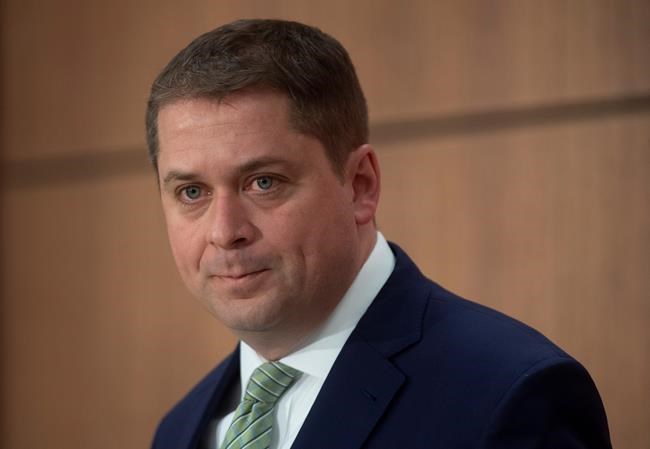MPs should return to House of Commons to scrutinize COVID-19 measures: Scheer
Advertisement
Read this article for free:
or
Already have an account? Log in here »
To continue reading, please subscribe:
Monthly Digital Subscription
$1 per week for 24 weeks*
- Enjoy unlimited reading on winnipegfreepress.com
- Read the E-Edition, our digital replica newspaper
- Access News Break, our award-winning app
- Play interactive puzzles
*Billed as $4 plus GST every four weeks. Offer only available to new and qualified returning subscribers. Cancel any time.
Read unlimited articles for free today:
or
Already have an account? Log in here »
Hey there, time traveller!
This article was published 15/04/2020 (1786 days ago), so information in it may no longer be current.
OTTAWA – With a Monday deadline looming, federal parties are grappling with the question of whether in-person sittings of the House of Commons and the Senate should resume in Ottawa.
The House of Commons is currently suspended until April 20 and without a deal among the parties to extend this suspension or to come up with an alternative, such as virtual sittings, Parliament will resume that day.
Conservative Leader Andrew Scheer repeated his call Wednesday to see MPs return to the House of Commons to question and scrutinize the Liberal government’s COVID-19 measures. He sent a letter to Prime Minister Justin Trudeau earlier this week saying in-person sittings of Parliament are an essential part of the democratic process.

The government has many questions to answer, Scheer said Wednesday, including why other countries are further ahead than Canada in testing and tracing of COVID-19, as well as why there continue to be shortages of necessary medical supplies and drugs.
Parliament must resume so that opposition parties can pose these questions and hold government accountable, Scheer said.
“We’ve already seen this before when opposition parties provide that rigorous scrutiny, when we engage in those debates, when we ask the tough questions on behalf of our constituents, we get better results for Canadians,” Scheer told reporters in Ottawa.
He stressed that his call for the House of Commons to resume was “not about partisanship.”
But he also lobbed politically charged statements at the Liberals about their reliance on the World Health Organization through the pandemic. On Tuesday, President Donald Trump announced plans to halt U.S. funding to the WHO pending a review of its role “in severely mismanaging and covering up the spread of the coronavirus.”
Scheer used his concerns about the WHO to bolster his argument for MPs returning to Ottawa.
“We’ve got serious concerns about the accuracy of the information coming out of the WHO and it’s incumbent upon this government to explain why they have based so many of their decisions on the WHO,” Scheer said.
A special sitting of Parliament was held over the weekend to pass the Liberals’ massive wage subsidy package. Government negotiated heavily with opposition parties to get the unanimous consent needed to pass its legislation.
This led to significant improvements to the bill and commitments from government to change other emergency measures to address gaps, says NDP House Leader Peter Julian.
“The motion that Parliament adopted on Saturday led to the extension of benefits to hundreds of thousands of people that were excluded by the government’s original plan,” he said.
This shows there is value in having a reduced number of MPs working in Ottawa on behalf of Canadians when legislation needs to be passed, he said.
But the NDP does not agree with the notion of resuming a regular calendar of parliamentary sittings. This would disenfranchise MPs who do not live within driving distance of Ottawa, if these sessions were to be held with a reduced number of MPs. And a full return of all 338 MPs to the House of Commons would be a public health risk, Julian said.
The NDP is instead proposing to sit in the House of Commons once a week with a reduced number of MPs to allow leaders to question the prime minister, while also holding regular virtual sittings in a committee-of-the-whole structure. That would see MPs from different regions ask questions for an hour a day to government ministers on issues important to their communities.
“It allows that questioning and accountability that makes for better policy, and we’ve certainly seen that in the last number of weeks,” Julian said.
Deputy Prime Minister Chrystia Freeland said government recognizes the importance of parliamentary debate and of the role opposition parties, especially in times of emergency.
Talks are underway with other party leaders and other House leaders to determine how to move forward on the issue of Parliament resuming, she said.
“We are all collaborating across all parties, we understand that we are in a crisis and that we must work together.”
But she also made a point to note that when MPs and senators return to work in Ottawa, supporting staff must also leave their homes and go to work.
“We want to protect our health and the health of all those who have to be here in the House of Commons when we work,” she said.
Scheer said he is not against the idea of virtual sittings as a way to add additional opportunities for MPs to take part who cannot travel to Ottawa, but he says it is possible for a reduced number of MPs to sit in chamber while respecting public health guidelines.
This report by The Canadian Press was first published April 15, 2020.


